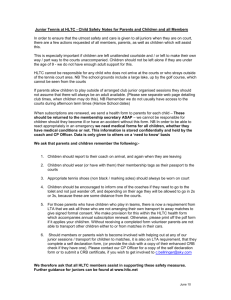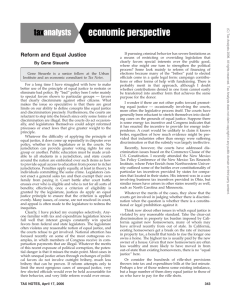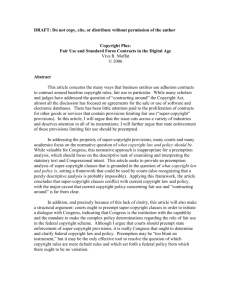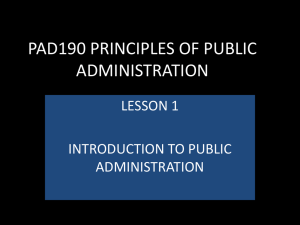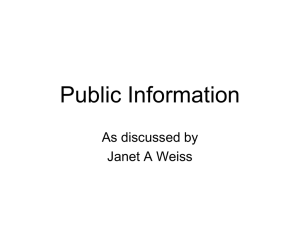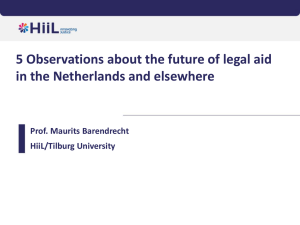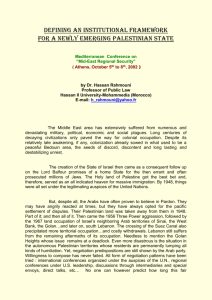FINAL EXAMINATION Question Bank
advertisement
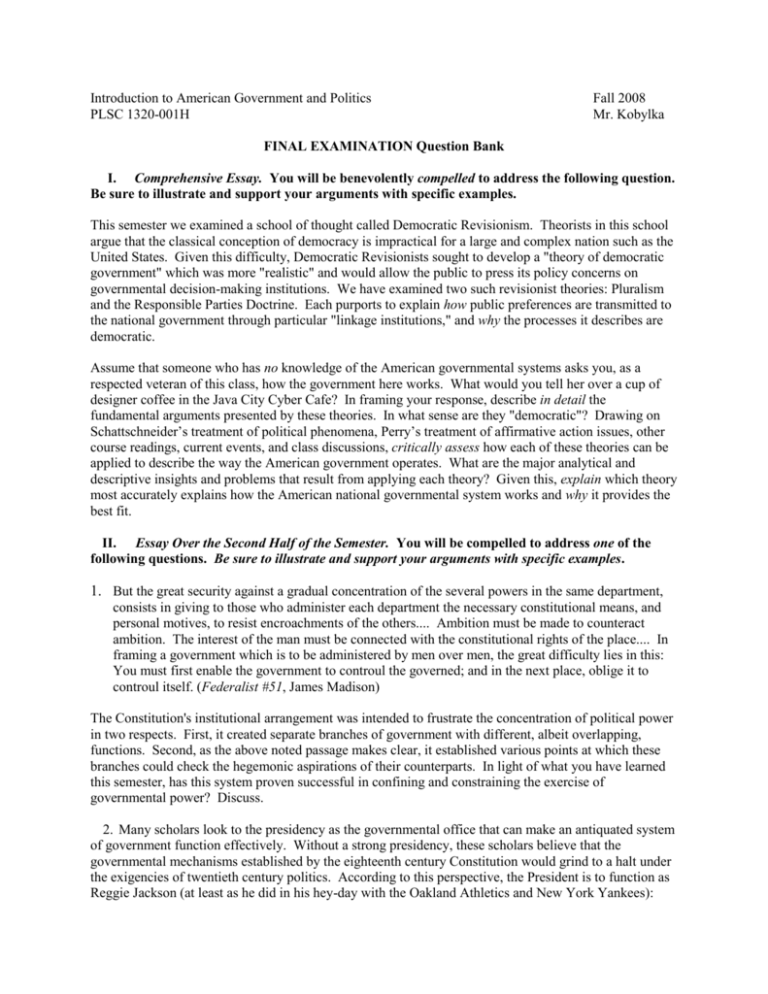
Introduction to American Government and Politics PLSC 1320-001H Fall 2008 Mr. Kobylka FINAL EXAMINATION Question Bank I. Comprehensive Essay. You will be benevolently compelled to address the following question. Be sure to illustrate and support your arguments with specific examples. This semester we examined a school of thought called Democratic Revisionism. Theorists in this school argue that the classical conception of democracy is impractical for a large and complex nation such as the United States. Given this difficulty, Democratic Revisionists sought to develop a "theory of democratic government" which was more "realistic" and would allow the public to press its policy concerns on governmental decision-making institutions. We have examined two such revisionist theories: Pluralism and the Responsible Parties Doctrine. Each purports to explain how public preferences are transmitted to the national government through particular "linkage institutions," and why the processes it describes are democratic. Assume that someone who has no knowledge of the American governmental systems asks you, as a respected veteran of this class, how the government here works. What would you tell her over a cup of designer coffee in the Java City Cyber Cafe? In framing your response, describe in detail the fundamental arguments presented by these theories. In what sense are they "democratic"? Drawing on Schattschneider’s treatment of political phenomena, Perry’s treatment of affirmative action issues, other course readings, current events, and class discussions, critically assess how each of these theories can be applied to describe the way the American government operates. What are the major analytical and descriptive insights and problems that result from applying each theory? Given this, explain which theory most accurately explains how the American national governmental system works and why it provides the best fit. II. Essay Over the Second Half of the Semester. You will be compelled to address one of the following questions. Be sure to illustrate and support your arguments with specific examples. 1. But the great security against a gradual concentration of the several powers in the same department, consists in giving to those who administer each department the necessary constitutional means, and personal motives, to resist encroachments of the others.... Ambition must be made to counteract ambition. The interest of the man must be connected with the constitutional rights of the place.... In framing a government which is to be administered by men over men, the great difficulty lies in this: You must first enable the government to controul the governed; and in the next place, oblige it to controul itself. (Federalist #51, James Madison) The Constitution's institutional arrangement was intended to frustrate the concentration of political power in two respects. First, it created separate branches of government with different, albeit overlapping, functions. Second, as the above noted passage makes clear, it established various points at which these branches could check the hegemonic aspirations of their counterparts. In light of what you have learned this semester, has this system proven successful in confining and constraining the exercise of governmental power? Discuss. 2. Many scholars look to the presidency as the governmental office that can make an antiquated system of government function effectively. Without a strong presidency, these scholars believe that the governmental mechanisms established by the eighteenth century Constitution would grind to a halt under the exigencies of twentieth century politics. According to this perspective, the President is to function as Reggie Jackson (at least as he did in his hey-day with the Oakland Athletics and New York Yankees): "the straw that stirs the drink." Discuss the nature of presidential power. What are the principal political and constitutional resources available to a President? What are the limits, if any, on the exercise of presidential power? Can the President consistently do what the aforenoted scholars demand? Can the President be Reggie Jackson? 3. Alexis De Tocqueville, after wandering about America in the early portion of the nineteenth Century, famously wrote: “There is hardly a political question in the United States which does not sooner or later turn into a judicial one” (Democracy in America, ed. J. P. Mayer, trans. George Lawrence, vol. 1, part 2, chapter 8, p. 270 (1969). Originally published in 1835–1840.). Barbara A. Perry’s The Michigan Affirmative Action Cases 2007) is a detailed account of the battle over the denial of admission of white applicants to the undergraduate and law schools of the University of Michigan. Ultimately, this conflict was resolved by the United States Supreme Court. Although it is an interesting story in and of itself, I want you to think about it in light of de Tocqueville’s comment. Was it a political or a legal conflict? Discuss, noting the different facets of the conflict. Did its dimensions change as it moved from its genesis to its resolution and, if so, how? What does this case study tell you about the veracity of the Tocquevillian insight? 4. An oft repeated refrain in American politics is that the courts are politicized and that this is inconsistent with their proper institutional role. Those who espouse this position largely focus on things such as the confirmation process, the nature of litigants before the courts, and the kinds of issues the courts decide. Implicit in this critique is a vision of a purely "legal" judiciary -- one not infiltrated by political considerations. Address this argument in light of what you know about the courts (N.B.: not just the Supreme Court). Use examples to explore the political aspects -- both internal and external to the courts themselves -- of the judicial process. Discuss the range and variety of political factors that work on, and within, courts. Is the critique outlined above descriptively accurate? Is the vision on which it rests plausible given the institutional setting of the courts and their relationship to the other branches of government and the people? Pointedly discuss. 5. Some students of politics suggest that the days of the legislature as an independent policy-making body are long since past. In this view, deliberative legislatures are rapidly becoming like dinosaurs -- extinct. A good question is "Why?" It is currently hypothesized that a gigantic meteor struck the earth with sufficient force to create a cloud of dust sufficiently dense to choke off the sunlight necessary for the growth of vegetation on which dinosaurs depended for sustenance. No one has suggested that a meteor is responsible for the current perceived eclipse of legislative institutions. But if we cannot blame a meteor, how can we explain the supposed demise of independent legislative bodies, specifically the U. S. Congress? Samuel Huntington offers one such thesis in his argument about Congress' "Adaptation Crisis." What is this argument (note its component parts), and how accurate is the analysis upon which it is grounded? Does its analysis hold today, or, in light of recent history, are its conclusions considerably time bound? Has Huntington formulated on a viable explanation for the decline of Congress as a legislative institution? Is Congress in decline?



